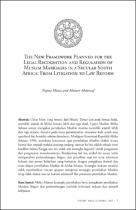The new framework planned for the legal recognition and regulation of Muslim marriages in a secular South Africa: From litigation to law reform
Abstract
Muslims, who originate from the East Indies and the Indian subcontinent, have a history in South Africa dating back more than three centuries. Attempts by South African Muslims to have their Muslim marriages (nikāḥs) recognized have a history spanning more than three decades, starting during white minority or apartheid rule and concluding during democracy. Although the Constitution of the Republic of South Africa, 1996, makes provision for Muslim marriages to be formally and separately recognized through legislation, it is a travesty of justice that there is, to date, no legislative framework for the recognition and regulation of the consequences flowing from such marriages. This article critically analyses recent and current litigation and judicial developments and parallel law reform and policy processes pertaining to the formal, future recognition and regulation of Muslim marriages in South Africa. As such, it does
not provide any detail regarding why Muslim marriages remain unrecognized or the substantive law content and regulation of Muslim marriages.
URI
https://journal.uinjkt.ac.id/index.php/ahkam/article/view/26076/10505http://hdl.handle.net/10566/7974

